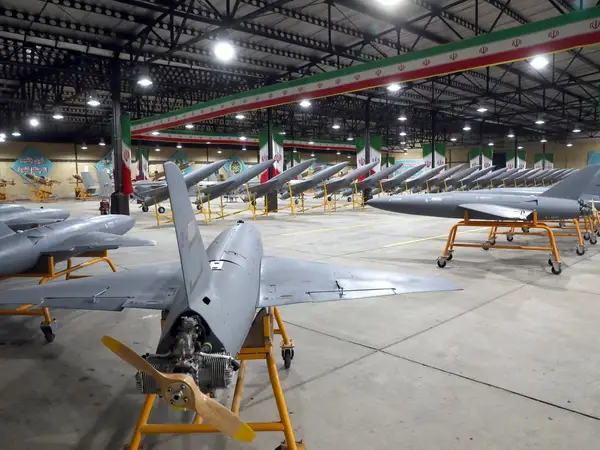Leading experts have warned Iran’s drone technology must be countered with a range of strategies to meet the growing threat.
In a policy forum at the Washington Forum on Thursday, General Kenneth McKenzie outlined how Iran drone technology is “being exported” and “having a battlefield effect” in Ukraine.
Now executive director of the Global & National Security Institute at University of South Florida, the retired US general said Iran has developed its drone technology to a point where it has an "overmatch" capability against its neighbors, allowing it to overwhelm their defenses.
He added that he believes Iran values their drones as much as their nuclear program.
The defense against the Iranian drone program is an integrated air and missile defense, in which the United States and allies share information in a way that does not impinge on individual states’ sovereignty, according to McKenzie, who emphasized the importance of meeting the threat to counter Iran’s influence.
Russia has used hundreds of Iranian Shahed suicide drones to attack Ukrainian infrastructure and try to overwhelm Kyiv’s air defenses during large-scale missile attacks.
Announcing new sanctions on Iran's military procurement networks, Secretary of State Antony Blinken said Thursday, "The United States remains firmly committed to taking action to disrupt Iran’s military programs and its procurement networks."
Damien Spleeters, deputy director of operations at Conflict Armaments Research, explained how disrupting supply chains for components and materials that go into Iran’s drone program can counter their capabilities.
The Islamic Republic needs parts that are produced abroad to sustain their drone program, said Spleeters, who added that both Russian and Iranian weapons depend upon components and technology from the West.
Spleeters called for cooperation from companies involved in both the manufacture and distribution of parts in order to trace the supply chain.
However, he warned that Iran is attempting to reduce the “footprint” of the supply chains from non-domestic sources going into its weapons systems and engineering program. If successful in their attempts to hide the identity of their suppliers, Iran will increasingly be able to defy sanctions.
Valerie Lincy oversees the Iran Watch website as the Wisconsin Project on Nuclear Arms Control, where she is executive director.
She described Iran’s drone technology as “mature and diversified”, and the product of state-run producers in Iran, working on design and manufacture, served by private companies in the Islamic Republic providing procurement and services. Lincy also outlined how individuals outside Iran are vital in providing help for the drone program.
Calling for the expansion of sanctions, Lincy said they can be effective in stopping foreign companies supplying Iran’s drone program, and may also deter prospective supplies from doing business with Tehran in the first place.
While sanctions and export controls have had some success, she said, there is far more that the EU can do against Iran’s drone program and foreign suppliers feeding into it. Lincy warned that China is a problem, with companies there directly supplying Iran with parts and technology for drones.
Allies must work together in a multi-pronged approach to counter the Iranian drone threat, she said, including using better export controls and increased intelligence sharing.
